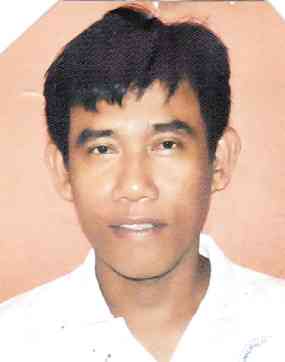
VERGEL Bico was gunned down by unidentified men while riding his motorcycle on his way home in Calapan City on Sept. 4, leaving behind his family who are struggling to live. CONTRIBUTED PHOTO
Vergel Bico was on his way home after buying fish from a wet market near their house in Barangay (village) Tibag in Calapan City when he was shot by unidentified men riding tandem on a motorcycle.
When he died at 4 p.m. on Sept. 4, Bico had scheduled the third issue of Kalahi, a monthly regional paper he just put up in Oriental Mindoro, for printing in Batangas across the sea.
If the killing was indeed work-related, the 41-year-old Bico would be the 158th journalist killed since 1986 when democracy was restored in the Philippines, according to the National Union of Journalists of the Philippines (NUJP).
“He did not want me to interfere in his work … I respected him for that,” said his widow, Editha, 43. She, however, recalled hearing him passionately talk against illegal activities, such as the illegal numbers game “jueteng” and jai-alai.
Bico wrote for the weekly Bandera Pilipino for two years until October last year. His last articles focused on illegal gambling, according to its publisher, Ronald Bula.
“Whatever the motive behind the killing, can a journalist’s life be taken away that easily?” said Editha’s brother, broadcaster Ed Mancera. His sentiments were shared by senior journalists who were present during Vergel’s wake.
The victim was also a part-time broadcaster at Radyo Natin in Naujan town, which is managed by Mancera.
A special task force under Senior Supt. Rolando de Jesus, director of Oriental Mindoro Police Office, which is investigating Bico’s case, is looking into both personal and work-related motives behind the killing.
Bico was shot twice in the head and brought to Maria Estrella General Hospital by policemen from the public safety department. He was declared dead on arrival, however.
Chief Insp. D’Artagnan Katalbas Jr., acting Calapan police chief, said the killers had tailed Bico from Barangay Balite and attacked him in Barangay Pachoca.
On Sept. 7, Bico was buried at the public cemetery in neighboring Baco town. His coffin was placed on top of a relative’s.
Editha said the wake was supposed to last four days but had to be cut short as all of the family members had arrived and “we could not afford additional expenses.”
“We didn’t have any savings nor did we invest in insurance,” she added.
On the week Bico was killed, a radio commentator, Fernando Solijon, was shot and killed in Iligan City in Mindanao.
“We’re very disappointed that killings continue to happen given a President who campaigned on a platform of human rights and made several promises that he’d work to solve the killings of journalists and those of others,” said Rowena Paraan, chairperson of the NUJP, who attended Bico’s burial rites.
If such a trend of unsolved killing would continue, Paraan said, Bico’s case would become a “closed book.”
Paraan said no mastermind had ever been convicted, saying this spoke much of the state of impunity in the country. “Out of 17 cases, only 10 cases have seen convictions, and these are mostly lookouts, drivers … a few gunmen,” she said.
Since her husband’s death, Editha said she had been struggling to send her children—aged 16, 15 and 13 years—to school. She takes laundry jobs to augment her husband’s irregular income.
Her family also pays P1,500 rent for an apartment.
“How the wife takes it (the killing) affects how the children take it,” Paraan said.
Besides case documentation, monitoring and lobbying, the NUJP conducts psychosocial activities for surviving spouses of slain journalists.
“We have noticed during these sessions, a lot of the wives are not very familiar with the risks in the work of their husbands, usually broadcasters,” Paraan said.
The trauma is much deeper because the spouses don’t have any idea how such a brutal killing could happen, she added.
Paraan said the local media community could help conduct an orientation among wives of journalists, whether or not there are threats on one’s life.
Meantime, she said she hoped the journalists could unite to do something about Bico’s death. A journalist’s killing leaves an impact on the community, she said.